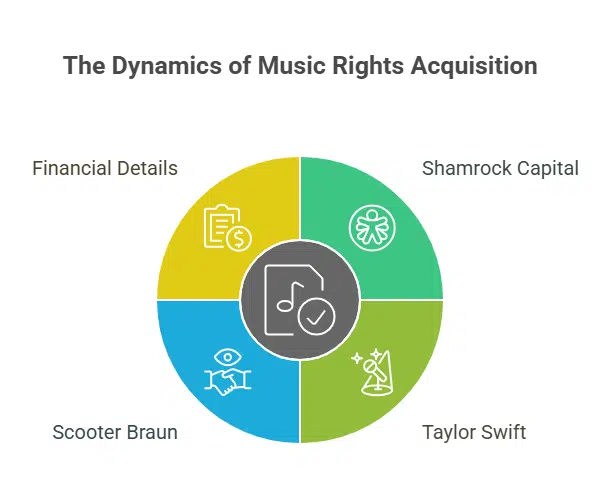Taylor Swift has officially reclaimed the master recordings of her first six studio albums, a major milestone in her career and a symbolic victory for artists fighting for ownership rights in the music industry. The pop superstar shared the emotional news through a personal letter published on her website, describing the moment as a “flashback sequence of all the times I daydreamed about, wished for, and pined away for a chance to get to tell you this news.”
“I almost stopped thinking it could happen, after 20 years of having the carrot dangled and then yanked away. But that’s all in the past now,” she wrote.
The Backstory: Losing Control in 2019
The battle for Swift’s masters began in 2019 when her former label, Big Machine Records, was sold to music executive Scooter Braun’s company, Ithaca Holdings. With that deal, Braun acquired the rights to Swift’s master recordings — the original sound recordings — of her first six albums:
-
Taylor Swift (2006)
-
Fearless (2008)
-
Speak Now (2010)
-
Red (2012)
-
1989 (2014)
-
Reputation (2017)
Swift, who had been vocal about her dissatisfaction with the sale, called the deal her “worst-case scenario” in a now-famous 2019 Tumblr post. She accused Braun of “incessant, manipulative bullying” over the years and expressed deep frustration that she was never given a fair opportunity to buy her masters herself.
Shamrock Capital and Taylor’s Strategic Move
In 2020, Braun sold the masters to private equity firm Shamrock Capital. Swift later revealed that the firm reached out to her in hopes of collaborating, but she declined due to Braun’s continued financial involvement in the deal at the time. Despite the tension, Shamrock Capital confirmed in a statement on Friday that they are “thrilled with this outcome and [we] are so happy for Taylor.”
Industry insiders estimate the catalog’s value to be in the range of $300–$450 million. While financial details of the recent acquisition haven’t been made public, credible outlets like Variety and Forbes have suggested Swift likely paid a substantial amount — possibly upward of $300 million — to finally secure full rights.
Braun, meanwhile, denied Swift’s allegations of bullying and told Variety in 2021 that he had offered to sell her catalog back but her team declined. In his most recent statement on Friday, he said simply, “I am happy for her.”
A Legacy Reclaimed: “All of the Music I’ve Ever Made… Now Belongs to Me”
Swift’s announcement was deeply emotional. “I’ve been bursting into tears of joy at random intervals ever since I found out that this is really happening,” she said. “I really get to say these words: All of the music I’ve ever made… now belongs to me.”
This moment caps off nearly five years of tireless effort to regain ownership of the music she created during her formative years as a rising country-pop star.
She also gave credit to her dedicated fan base, known as “Swifties,” for their unwavering support throughout the process. “Thank you for helping to reunite me with this art that I have dedicated my life to, but have never owned until now.”
“Taylor’s Version” and the Re-Recording Revolution
In 2021, in response to losing her masters, Swift began re-recording her albums to create new, legally distinct versions — dubbed Taylor’s Version — which she fully owns and controls. So far, she has released re-recordings of:
-
Fearless (Taylor’s Version) – April 2021
-
Red (Taylor’s Version) – November 2021
-
Speak Now (Taylor’s Version) – July 2023
-
1989 (Taylor’s Version) – October 2023
These re-recordings have not only been commercial successes — topping global charts — but have also reinforced Swift’s influence in reshaping the music industry. They have educated younger artists about contractual pitfalls and ownership rights, prompting many to reevaluate their own label agreements.
What’s Next: “Debutation” and Reputation on the Horizon
Despite this monumental milestone, Swift’s journey isn’t completely over. Two albums — her 2006 debut Taylor Swift and her 2017 comeback Reputation — have yet to be released as “Taylor’s Version.”
Fans, eager for their release, have coined the term “Debutation” to celebrate the eventual re-recording of her debut album. In her letter, Swift confirmed that she has already recorded the entire Taylor Swift album, including early favorites like “Teardrops on My Guitar” and “Tim McGraw.”
As for Reputation, she admitted she’s “barely made a dent” into re-recording the album, which includes hits such as “Look What You Made Me Do” and “Delicate.” However, she hinted that fans may not have to wait too long. The Taylor’s Version of “Look What You Made Me Do” was featured in the May 20 episode of The Handmaid’s Tale on Hulu — a subtle sign that the re-recorded version is in progress.
“These albums can still have their moment to re-emerge when the time is right,” she teased.
A Record-Breaking Tour and Hints of a Film Project
Swift’s historic Eras Tour, which concluded in Vancouver in December 2024, played a crucial role in making this deal possible. With 149 shows across 50 cities on five continents, the tour broke global records and reportedly grossed over $1 billion, making it the highest-grossing tour in music history.
She credited the tour and its fan support as instrumental in her ability to purchase the catalog outright.
Adding to the speculation, IMAX posted a mysterious photo of a friendship bracelet on its official social media accounts shortly after Swift’s announcement — a signature symbol of her fandom. Fans believe this might be a teaser for a forthcoming concert documentary or theatrical release of The Eras Tour, especially since Swift was seen with multiple cameras capturing footage on stage during her performances.
IMAX has yet to comment officially, simply telling fans to “calm down” in a light-hearted follow-up post.
A Turning Point for Artists Everywhere
Swift’s acquisition is more than just a personal victory — it sets a precedent in the global music industry. Her case has become a textbook example of how artists can fight for, and eventually reclaim, what is rightfully theirs, even when facing billion-dollar corporations.
Her decision to speak out publicly, re-record her catalog, and take legal steps toward ownership has inspired musicians around the world to prioritize their creative rights and push for more equitable industry standards.
Taylor Swift’s long-awaited victory is not only a defining moment in her career but a landmark for artist empowerment in the modern music industry. As she now officially owns all of her music — past and present — her legacy becomes even more deeply rooted in integrity, resilience, and trailblazing leadership.





































